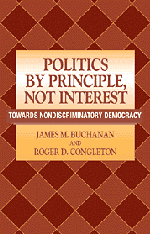Book contents
4 - Extending the argument
Published online by Cambridge University Press: 27 March 2010
Summary
The simple interaction models introduced in earlier chapters share a common feature that must be examined further. In each setting, the participants are described by behavioral symmetry in the absence of or prior to collective action. The Nash equilibrium is reached when each person maximizes personal anticipated payoffs from independent or private action. This setting is, of course, familiar and is analyzed variously in the standard PD models of game theory, in the “tragedy of the commons,” with Samuelsonian public goods phenomena. Our own example, that of David Hume's farmers who might join forces to drain the adjacent meadow, is broadly illustrative. In the terminology of Chapter 2, the models presume that the Nash or independent adjustment equilibrium is on the diagonal of the imaginary matrix. We must examine the extent to which this on-diagonal feature is important for the relevant normative conclusion concerning the efficiency of a generality constraint.
At this point it is useful to recall just what our analytical enterprise in this book is all about. Our normative concern is about political discrimination among separate persons and groups – discrimination that is reflected in unequal or differential treatment at the dictates of a governmental-collective authority, as guided by some decision rule or process. The generality norm, elaborated through the on-diagonal metaphor in earlier chapters, is aimed toward enforcing uniformity in political treatment for all persons in the polity. This norm does not, and should not, imply uniformity in behavior or actions by individuals in their private or noncollective spheres of activity. Outside the realm of collective action, individuals should be at liberty to act as they prefer, within the constraints that each one separately confronts.
- Type
- Chapter
- Information
- Politics by Principle, Not InterestTowards Nondiscriminatory Democracy, pp. 42 - 49Publisher: Cambridge University PressPrint publication year: 1998



